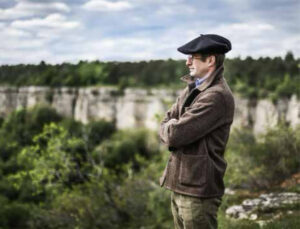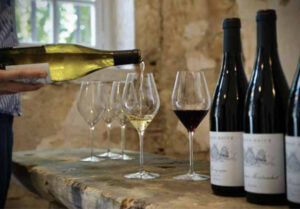Sustainability, circular economy in burgundy.
From the vine to the table

It’s hard to define Armand Heitz, as he is many things: a winemaker, entrepreneur, agronomist, environmentalist, a cultured reader of Masanobu Fukuoka, and a follower of the Cîteaux monks and their connection to the land. Originally from Burgundy, he possesses the wisdom of the land and a certain stubbornness, which makes Heitz a complex and unique figure in the Burgundy landscape, a “strange animal,” as he likes to call himself. If we had to define him in one word, we might say: liberal. But not as one would imagine. A rural, humanist, spiritual liberal. Grounded yet visionary, as proud as he is humble. His legacy has been transformed into a challenge.
The Domaine Heitz was founded in the mid-19th century when the Nié-Vantey family acquired vineyard parcels in Burgundy. Through inheritances and marriages, the estate remained within the family until 2011, when Armand, a 24-year-old with a degree in oenology, took over. He started in 2013 with just 3 hectares of vineyards and a vision to create something truly unique. His first vintage was released soon after, marking the beginning of a journey driven by passion and precision. Then he decided to expand the vision: to create a great vineyard, a life project, a legacy to pass on. A challenge that lasted ten years. Today, the estate spans from Beaune to Chassagne-Montrachet, covering some of the most prestigious climats in the Côte de Beaune: Pommard 1er Cru, Chevalier-Montrachet Grand Cru, Meursault 1er Cru, among others. In each of these parcels, Heitz seeks the perfect balance between purity, territorial identity, and respect for the land.
More of an agronomist than an ideologue, his principles are firm: respect for nature, transparency in wine, consistency with oneself. He tried biodynamics, then switched to permaculture and agroecology, but without hesitation admitting that, on exhausted soils, sometimes a touch of glyphosate is less devastating than plowing. “Yes, glyphosate is awful,” he says, “but in some cases, it’s the chemotherapy the soil needs.” Here, his agronomic pragmatism shines through, often making him seem contradictory. But it’s a pragmatic approach that’s consistent, honest, and always in service of the land.
Armand’s position is not one of blind adherence to any method, but rather one of pragmatic flexibility. He acknowledges that both traditional plowing and the use of glyphosate have significant environmental impacts, and that in certain contexts, choosing between them is a question of balancing short-term damage to the soil versus long-term sustainability. He emphasizes that the problem lies not in these tools themselves, but in an agricultural system that has pushed the land to its limits. In his view, it’s essential to transition beyond reliance on both practices through innovative solutions, such as cover crops, mulching, and careful vineyard management. This approach aligns with his overall philosophy: balance, adaptability, and respect for nature.
In addition to the soil management approach, Armand places great emphasis on diversification of grape varieties. He grows a range of authorized varietals beyond the traditional Burgundy staples—such as Aligoté, Melon de Bourgogne, and even Souvignier Gris—seeking resilience and adaptability in the face of changing climates and soils. Furthermore, his work on cover cropping and natural grass cover (enherbement) contributes to soil health and biodiversity, alongside his choice of alternative vine-training systems that respect the natural growth patterns of the vines. All these practices form part of his broader commitment to agroecology and sustainable viticulture.
Armand has also chosen to integrate BRF (Broyé de Roches Fragmentées) into his vineyard management strategy. This organic material, derived from the crushing of natural rocks like basalt, is used as a form of mulching that improves soil health by enriching it with minerals and fostering microbial life. By applying this technique, Heitz maintains soil fertility without relying on chemical fertilizers. This practice contributes to soil structure, water retention, and the overall health of the vineyard ecosystem.
We’re talking about a coherent and accessible ecosystem. Leading a small team of 25 employees, Heitz has created an integrated structure, blending vineyards, livestock farming, agritourism, and dining. The restaurant, Chez Armand, located at Château de Mimande, is one of the most concrete expressions of this vision. Here, a “farm-to-fork” cuisine is offered—simple and tied to the terroir, with meats sourced directly from his own farms (cattle and lamb). His animals are fed with grass and cereals grown on-site, ensuring a short supply chain and ethical quality. The menu changes frequently, but always stays true to seasonal and local products. And, unlike many in Burgundy, the wines from the estate are sold at accessible prices: deliberately kept from the speculation of luxury wine markets. A political choice, rather than a commercial one.
Armand Heitz doesn’t like extremes: neither the ecological ones that deny agricultural reality nor the industrial ones that reduce everything to profit and performance. He critiques overproduction, overmodernity, and the cult of money, but is also a responsible entrepreneur who works seriously with the goal of leaving a mark—also a human one. For him, freedom is a form of responsibility: towards his daughters, towards the heritage, towards the place where he lives.
The wines are presented with a traditional style that also looks to the contemporary, faithful to the origin of the soil and its taste.

